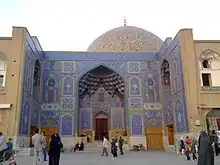伊万 (建筑)
伊万(波斯語:,拉丁转写:eyvān;阿拉伯语:;Iwan、ivan;土耳其语:eyvan[1][2])是波斯和伊斯兰建筑中常见的一种长方形、带有拱顶的空间,三面围墙,一面开放。它由波斯人发明,3世纪时在帕提亚帝国治下达到成熟。在波斯语中伊万的入口門面又称“皮西塔克”(pishtaq)。其上常绘有繁复的几何花纹和伊斯兰书法[3][4]。伊万的大小和形状并不完全固定。
.JPG.webp)
泰姬陵的伊万
参考文献
- Wright (1992), p. 508
- Boas (2010), p. 366
- Dictionary of Islamic architecture: Pishtaq (页面存档备份,存于) archnet.org.
- Pishtaq (页面存档备份,存于) Britannica.
- Bier, Lionel. . Ars Orientalis. 1993, 23: 57–66.
- Boas, Adrian J. . Brill. 2010. ISBN 978-90-04-18272-1.
- Curatola, Giovanni; Scarcia, Gianroberto. . Translated by Marguerite Shore. London: Abbeville Press. 2004.
- Downey, Susan B. . Princeton, NJ: Princeton University Press. 1988. ISBN 9780691035895.
- Farrokh, Kaveh. . Osprey Publishing. 2007. ISBN 1-84603-108-7.
- Gillispie, Charles Coulston; Dewachter, Michel. . Princeton, NJ: Princeton Architectural Press. 1987. ISBN 9780910413213.
- Godard, André. . Ars Islamica. 1951, 15.
- Keall, Edward J. . Dickran Kouymjian (编). . Beirut: American University of Beirut. 1974: 123–130.
- Kurz, Otto. . Journal of the Royal Asiatic Society of Great Britain and Ireland. 1941, 73 (1): 37–41. doi:10.1017/S0035869X00093138.
- Najm, Ra'ef. . Islamic Studies. 2001, 40 (3): 721–734. JSTOR 20837154.
- Rabbat, Nasser O. . Geneva: AKTC. 1989.
- Rawson, Jessica, Chinese Ornament: The Lotus and the Dragon, 1984, British Museum Publications, ISBN 0714114316
- Reade, Julian. Christopher Scarre , 编. . Thames & Hudson. 1999. ISBN 0-500-05096-1.
- Sitwell, Sacheverell. . Robert Hale. 1957.
- Smith, W. Stevenson; Simpson, William Kelly. . Pelican history of art 14. New Haven, CT: Yale University Press. 1998. ISBN 9780300077476.
- Upton, Joseph M. (PDF). The Metropolitan Museum of Art Bulletin. 1932, 27 (8): 188–197 [2018-11-21]. (原始内容存档 (PDF)于2017-02-23).
- Warren, John; Fethi, Ihsan. . Coach Publishing House. 1982. ISBN 9780902608016.
- Wright, G. R. H. . Brill. 1992. ISBN 90-04-09547-0.
This article is issued from Wikipedia. The text is licensed under Creative Commons - Attribution - Sharealike. Additional terms may apply for the media files.
.jpg.webp)
